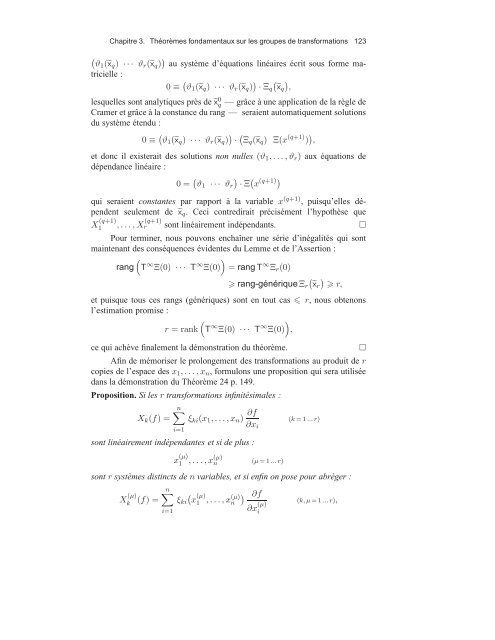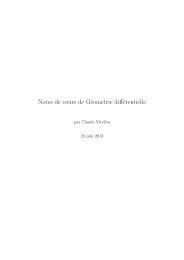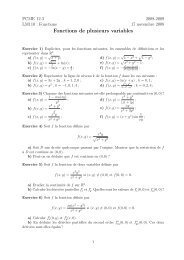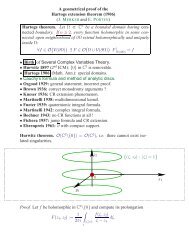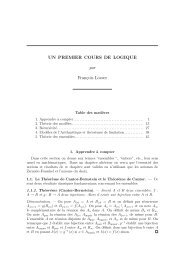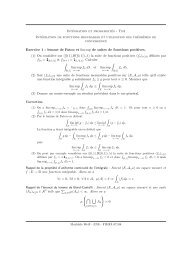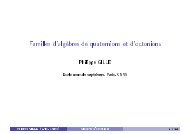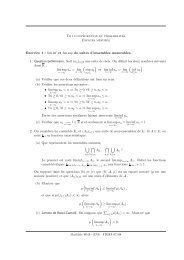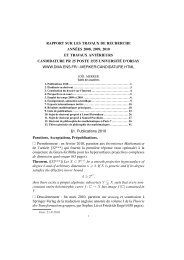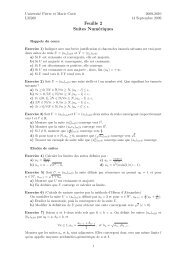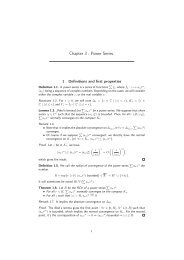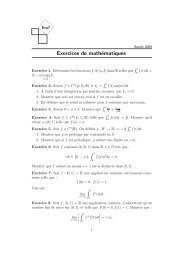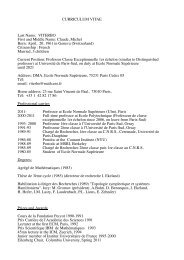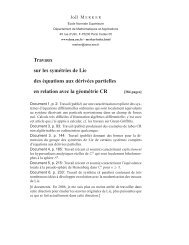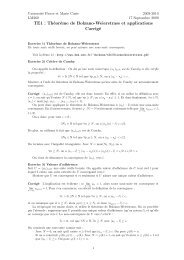- Page 3:
Préfacepar Jean-Jacques Szczecinia
- Page 10 and 11:
xJean-Jacques SzczeciniarzMais c’
- Page 12 and 13:
xiiJean-Jacques Szczeciniarzde la p
- Page 14 and 15:
xivJean-Jacques Szczeciniarzles exi
- Page 16 and 17:
xviJean-Jacques Szczeciniarzson car
- Page 18 and 19:
xviiiJoël Merkerpour l’architect
- Page 20 and 21:
xxJoël MerkerErhard Scholz, qui a
- Page 22 and 23:
xxiiJoël MerkerPartie IILieIntrodu
- Page 25 and 26:
Partie I :Introduction philosophiqu
- Page 27 and 28:
Chapitre 1. L’ouverture riemannie
- Page 29 and 30:
Chapitre 1. L’ouverture riemannie
- Page 31 and 32:
Chapitre 1. L’ouverture riemannie
- Page 33 and 34:
Chapitre 1. L’ouverture riemannie
- Page 35 and 36:
Chapitre 1. L’ouverture riemannie
- Page 37 and 38:
Chapitre 1. L’ouverture riemannie
- Page 39 and 40:
Chapitre 1. L’ouverture riemannie
- Page 41 and 42:
Chapitre 1. L’ouverture riemannie
- Page 43 and 44:
Chapitre 1. L’ouverture riemannie
- Page 45 and 46:
Chapitre 1. L’ouverture riemannie
- Page 47 and 48:
Chapitre 1. L’ouverture riemannie
- Page 49 and 50:
Chapitre 1. L’ouverture riemannie
- Page 51 and 52:
Chapitre 1. L’ouverture riemannie
- Page 53 and 54:
Chapitre 1. L’ouverture riemannie
- Page 55 and 56:
Chapitre 1. L’ouverture riemannie
- Page 57 and 58:
Chapitre 1. L’ouverture riemannie
- Page 59 and 60:
Chapitre 1. L’ouverture riemannie
- Page 61 and 62:
Chapitre 1. L’ouverture riemannie
- Page 63 and 64:
Chapitre 1. L’ouverture riemannie
- Page 65 and 66:
Chapitre 1. L’ouverture riemannie
- Page 67 and 68:
Chapitre 1. L’ouverture riemannie
- Page 69 and 70:
Chapitre 1. L’ouverture riemannie
- Page 71 and 72:
Chapitre 1. L’ouverture riemannie
- Page 73 and 74:
Chapitre 1. L’ouverture riemannie
- Page 75 and 76:
Chapitre 2 :La mobilité helmholtzi
- Page 77 and 78:
Chapitre 2. La mobilité helmholtzi
- Page 79 and 80:
Chapitre 2. La mobilité helmholtzi
- Page 81 and 82:
Chapitre 2. La mobilité helmholtzi
- Page 83 and 84:
Chapitre 2. La mobilité helmholtzi
- Page 85 and 86:
Chapitre 2. La mobilité helmholtzi
- Page 87 and 88:
Chapitre 2. La mobilité helmholtzi
- Page 89 and 90:
Chapitre 2. La mobilité helmholtzi
- Page 91 and 92:
Chapitre 2. La mobilité helmholtzi
- Page 93 and 94:
Chapitre 2. La mobilité helmholtzi
- Page 95 and 96: Chapitre 2. La mobilité helmholtzi
- Page 97 and 98: Chapitre 2. La mobilité helmholtzi
- Page 99 and 100: Chapitre 2. La mobilité helmholtzi
- Page 101 and 102: Chapitre 2. La mobilité helmholtzi
- Page 103 and 104: Partie II :Introduction mathématiq
- Page 105 and 106: Présentation mathématique génér
- Page 107 and 108: Chapitre 3 :Théorèmes fondamentau
- Page 109 and 110: Chapitre 3. Théorèmes fondamentau
- Page 111 and 112: Chapitre 3. Théorèmes fondamentau
- Page 113 and 114: Chapitre 3. Théorèmes fondamentau
- Page 115 and 116: Chapitre 3. Théorèmes fondamentau
- Page 117 and 118: Chapitre 3. Théorèmes fondamentau
- Page 119 and 120: Chapitre 3. Théorèmes fondamentau
- Page 121 and 122: Chapitre 3. Théorèmes fondamentau
- Page 123 and 124: Chapitre 3. Théorèmes fondamentau
- Page 125 and 126: Chapitre 3. Théorèmes fondamentau
- Page 127 and 128: Chapitre 3. Théorèmes fondamentau
- Page 129 and 130: Chapitre 3. Théorèmes fondamentau
- Page 131 and 132: Chapitre 3. Théorèmes fondamentau
- Page 133 and 134: Chapitre 3. Théorèmes fondamentau
- Page 135 and 136: Chapitre 3. Théorèmes fondamentau
- Page 137 and 138: Chapitre 3. Théorèmes fondamentau
- Page 139 and 140: Chapitre 3. Théorèmes fondamentau
- Page 141 and 142: Chapitre 3. Théorèmes fondamentau
- Page 143 and 144: Chapitre 3. Théorèmes fondamentau
- Page 145: Chapitre 3. Théorèmes fondamentau
- Page 149 and 150: Chapitre 3. Théorèmes fondamentau
- Page 151 and 152: Chapitre 3. Théorèmes fondamentau
- Page 153 and 154: Chapitre 3. Théorèmes fondamentau
- Page 155 and 156: Chapitre 3. Théorèmes fondamentau
- Page 157 and 158: Chapitre 3. Théorèmes fondamentau
- Page 159 and 160: Chapitre 3. Théorèmes fondamentau
- Page 161 and 162: Chapitre 3. Théorèmes fondamentau
- Page 163 and 164: Chapitre 3. Théorèmes fondamentau
- Page 165 and 166: Chapitre 3. Théorèmes fondamentau
- Page 167 and 168: Chapitre 3. Théorèmes fondamentau
- Page 169 and 170: Chapitre 3. Théorèmes fondamentau
- Page 171 and 172: Chapitre 3. Théorèmes fondamentau
- Page 173 and 174: Chapitre 3. Théorèmes fondamentau
- Page 175 and 176: Chapitre 3. Théorèmes fondamentau
- Page 177 and 178: Chapitre 3. Théorèmes fondamentau
- Page 179 and 180: Chapitre 3. Théorèmes fondamentau
- Page 181 and 182: Chapitre 3. Théorèmes fondamentau
- Page 183 and 184: Partie III :Traduction française c
- Page 185 and 186: Remarques préliminaires 161il dema
- Page 187 and 188: Remarques préliminaires 163lui «
- Page 189 and 190: Remarques préliminaires 165Riemann
- Page 191 and 192: Groupes de R 3 pour lesquels deux p
- Page 193 and 194: Groupes de R 3 pour lesquels deux p
- Page 195 and 196: Groupes de R 3 pour lesquels deux p
- Page 197 and 198:
Groupes de R 3 pour lesquels deux p
- Page 199 and 200:
Groupes de R 3 pour lesquels deux p
- Page 201 and 202:
Groupes de R 3 pour lesquels deux p
- Page 203 and 204:
Groupes de R 3 pour lesquels deux p
- Page 205 and 206:
Groupes de R 3 pour lesquels deux p
- Page 207 and 208:
Groupes de R 3 pour lesquels deux p
- Page 209 and 210:
Groupes de R 3 pour lesquels deux p
- Page 211 and 212:
Groupes de R 3 pour lesquels deux p
- Page 213 and 214:
Groupes de R 3 pour lesquels deux p
- Page 215 and 216:
Groupes de R 3 pour lesquels deux p
- Page 217 and 218:
Groupes de R 3 pour lesquels deux p
- Page 219 and 220:
Groupes de R 3 pour lesquels deux p
- Page 221 and 222:
Groupes de R 3 pour lesquels deux p
- Page 223 and 224:
Groupes de R 3 pour lesquels deux p
- Page 225 and 226:
Groupes de R 3 pour lesquels deux p
- Page 227 and 228:
Groupes de R 3 pour lesquels deux p
- Page 229 and 230:
Groupes de R 3 pour lesquels deux p
- Page 231 and 232:
Groupes de R 3 pour lesquels deux p
- Page 233 and 234:
Groupes de R 3 pour lesquels deux p
- Page 235 and 236:
Groupes de R 3 pour lesquels deux p
- Page 237 and 238:
Groupes de R 3 pour lesquels deux p
- Page 239 and 240:
Groupes de R 3 pour lesquels deux p
- Page 241 and 242:
Groupes de R 3 pour lesquels deux p
- Page 243 and 244:
Groupes de R 3 pour lesquels deux p
- Page 245 and 246:
Critique des recherches helmholtzie
- Page 247 and 248:
Critique des recherches helmholtzie
- Page 249 and 250:
Critique des recherches helmholtzie
- Page 251 and 252:
Critique des recherches helmholtzie
- Page 253 and 254:
Critique des recherches helmholtzie
- Page 255 and 256:
Critique des recherches helmholtzie
- Page 257 and 258:
Critique des recherches helmholtzie
- Page 259 and 260:
Critique des recherches helmholtzie
- Page 261 and 262:
Critique des recherches helmholtzie
- Page 263 and 264:
Critique des recherches helmholtzie
- Page 265 and 266:
Critique des recherches helmholtzie
- Page 267 and 268:
Critique des recherches helmholtzie
- Page 269 and 270:
Critique des recherches helmholtzie
- Page 271 and 272:
Critique des recherches helmholtzie
- Page 273 and 274:
Critique des recherches helmholtzie
- Page 275 and 276:
Critique des recherches helmholtzie
- Page 277 and 278:
Critique des recherches helmholtzie
- Page 279 and 280:
Critique des recherches helmholtzie
- Page 281 and 282:
(41)et :Critique des recherches hel
- Page 283 and 284:
Critique des recherches helmholtzie
- Page 285 and 286:
Première solution au problème de
- Page 287 and 288:
Première solution au problème de
- Page 289 and 290:
Première solution au problème de
- Page 291 and 292:
Première solution au problème de
- Page 293 and 294:
Première solution au problème de
- Page 295 and 296:
Première solution au problème de
- Page 297 and 298:
Première solution au problème de
- Page 299 and 300:
Première solution au problème de
- Page 301 and 302:
Première solution au problème de
- Page 303 and 304:
Première solution au problème de
- Page 305 and 306:
Première solution au problème de
- Page 307 and 308:
Première solution au problème de
- Page 309 and 310:
Première solution au problème de
- Page 311 and 312:
Première solution au problème de
- Page 313 and 314:
Chapitre 23.Deuxième solution du p
- Page 315 and 316:
Deuxième solution au problème de
- Page 317 and 318:
Deuxième solution au problème de
- Page 319 and 320:
Deuxième solution au problème de
- Page 321 and 322:
Deuxième solution au problème de
- Page 323 and 324:
Deuxième solution au problème de
- Page 325 and 326:
Deuxième solution au problème de
- Page 327 and 328:
Deuxième solution au problème de
- Page 329 and 330:
suivante :Deuxième solution au pro
- Page 331 and 332:
Deuxième solution au problème de
- Page 333 and 334:
Deuxième solution au problème de
- Page 335 and 336:
Deuxième solution au problème de
- Page 337 and 338:
ou bien la forme :Deuxième solutio
- Page 339:
Deuxième solution au problème de
- Page 342 and 343:
318 Bibliographie[18] Boi, L. ; Fla
- Page 344 and 345:
320 Bibliographie[62] Gorbatsevich,
- Page 346 and 347:
322 Bibliographie[105] Lobachevski
- Page 348 and 349:
324 Bibliographie[150] Sinaceur, M.


